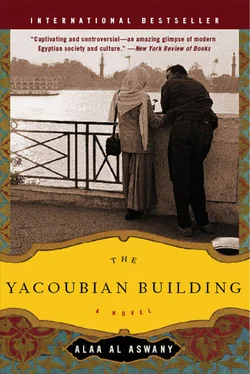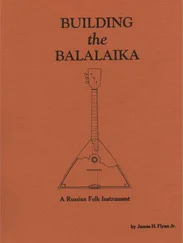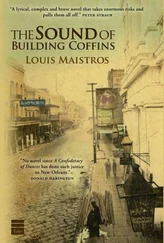Alaa Al Aswany - The Yacoubian Building
Здесь есть возможность читать онлайн «Alaa Al Aswany - The Yacoubian Building» весь текст электронной книги совершенно бесплатно (целиком полную версию без сокращений). В некоторых случаях можно слушать аудио, скачать через торрент в формате fb2 и присутствует краткое содержание. Год выпуска: 2006, ISBN: 2006, Издательство: Adobe Acrobat eBook Reader, Жанр: Современная проза, на английском языке. Описание произведения, (предисловие) а так же отзывы посетителей доступны на портале библиотеки ЛибКат.
- Название:The Yacoubian Building
- Автор:
- Издательство:Adobe Acrobat eBook Reader
- Жанр:
- Год:2006
- ISBN:978-0-06-087813-9
- Рейтинг книги:5 / 5. Голосов: 1
-
Избранное:Добавить в избранное
- Отзывы:
-
Ваша оценка:
- 100
- 1
- 2
- 3
- 4
- 5
The Yacoubian Building: краткое содержание, описание и аннотация
Предлагаем к чтению аннотацию, описание, краткое содержание или предисловие (зависит от того, что написал сам автор книги «The Yacoubian Building»). Если вы не нашли необходимую информацию о книге — напишите в комментариях, мы постараемся отыскать её.
The Yacoubian Building — читать онлайн бесплатно полную книгу (весь текст) целиком
Ниже представлен текст книги, разбитый по страницам. Система сохранения места последней прочитанной страницы, позволяет с удобством читать онлайн бесплатно книгу «The Yacoubian Building», без необходимости каждый раз заново искать на чём Вы остановились. Поставьте закладку, и сможете в любой момент перейти на страницу, на которой закончили чтение.
Интервал:
Закладка:
Dawlat remarried twice after him but had no more children — two failed marriages that left her bitter, nervy, and a cigarette smoker. Then her daughter grew up, married, and emigrated to Canada. When her son graduated from the School of Medicine, Dawlat waged a fierce battle to stop him emigrating. She wept and screamed and implored all her relatives to convince him to remain with her, but the young doctor, like most of his generation, was sick to despair of the situation in Egypt. He was determined to emigrate and offered to take his mother with him but she refused and was left on her own.
She rented out her flat in Garden City furnished and moved in to live with Zaki downtown, and from the first day the two old people had not stopped feuding and battling as though they were sworn enemies. Zaki had got used to his independence and freedom and it had become difficult for him to accept anyone else sharing his life — to accept that he would have to stick to appointed times for sleeping and eating and that he would have to tell Dawlat ahead of time if he intended to stay out late. Her presence prevented him from inviting girlfriends home, and her barefaced interference in his most private affairs and her constant attempts to dominate him made her even harder to put up with.
From her side, Dawlat endured loneliness and unhappiness and it grieved her that she should end her life without accomplishments or achievements after failing in marriage and seeing her children leave her in her old age. It provoked her greatly that Zaki seemed in no way like a failing old man waiting for death, but still wore scent and played the fop and chased women. No sooner did she catch sight of him smiling and humming in front of the mirror as he primped his clothes or notice that he was happy and in high spirits than she would feel a resentment that wouldn’t subside until she’d picked a quarrel with him and flayed him with her tongue. She attacked his childish ways and whims not from a standpoint based on any moral objections but simply because his clinging to life in this way didn’t match her own despair, her fury at him being akin to that felt by mourners at the man who guffaws in the middle of a funeral.
In addition, there lay between the two old people all the irritability, impatience, and obstinacy that go with old age, plus that certain tension that develops when two individuals live in too close proximity to one another — from one using the bathroom for a long time when the other wants it, from one seeing the sullen face the other wears when he wakes from sleeping, from one wanting silence while the other insists on talking, from the mere presence of another person who never leaves you day and night, who stares at you, who interrupts you, who picks on everything you say, and the grating of whose molars when he chews sets you on edge, and the ringing noise of whose spoon striking the dishes disturbs your quiet every time he sits down to eat with you.
Zaki Bey el Dessouki stayed stretched out on the bed going over these events and gradually drowsiness started to overcome him. However, his bad day wasn’t over yet, for it was not long before he heard, as he lay between sleeping and waking, the grating of the spare key, which Dawlat had known where to find. She opened the door, approached him, and, eyes wide with resentment and voice gasping with emotion, said, “Where’s the ring, Zaki?”

Thus Your Excellency Mr. President will see that your son Taha Muhammad el Shazli has suffered injustice and the violation of his rights at the hands of the presiding general of the interviewing committee at the Police Academy. The Prophet — God bless him and give him peace — has said, in a sound hadith, “Verily, your people who were before you would leave alone a nobleman if he stole, and would invoke the punishment against a poor man if he stole. By God, even if Fatima, daughter of Muhammad, stole, I would cut off her hand.” The Prophet of God has spoken truly.
Mr. President, I went to great trouble and made great efforts in order to obtain a score of 98 (Humanities), and I was able, through God ’s bounty, to pass all the tests for admission to the Police Academy. Is it then just, Mr. President, that I should be denied admission to the police force for no better reason than that my father is a decent but poor man who works as a property guard? Is not the guarding of property a decent occupation, and is not every decent occupation to be respected, Mr. President? I ask you, Mr. President, to look into this complaint with the eye of a loving father who will never agree that injustice be done to one of his sons. My future, Mr. President, awaits a decision from Your Excellency and I am confident that, the Almighty willing, I shall meet with fair treatment at your noble hands.
May God preserve you as an asset for Islam and the Muslims,
Your sincere son, Taha Muhammad el Shazli
Identity Card No.19578, Kasr El Nil
Address: The Yacoubian Building, 34 Talaat Harb Street, Cairo

Like a victorious wartime general who enters in triumph a city he has conquered after bitter fighting, Malak Khilla appeared on the roof of the building to take possession of his new room in a happy and vainglorious mood. He was wearing his blue people’s suit that he kept for special occasions and had hung around his neck a long tape measure that was for him — like an officer’s pips or a doctor’s stethoscope — the distinguishing mark of his professional status as a master shirtmaker. That morning he brought with him a number of workmen to get the room ready — a smith, an electrician, a plumber, and some young male assistants to help them.
Master craftsman Malak muttered a prayer of thanks to the Virgin and Christ the Savior, then stretched out his hand to open the door to the room for the first time. The air inside was musty because it had been closed for a whole year following the death of Atiya the newspaper seller (some of whose effects Malak found and had one of the boys collect in a large cardboard box).
Now Malak stands in the middle of the room after opening the window and letting sunlight flood the place and issues detailed instructions to the workmen as to what they have to do. From time to time, one of the residents of the roof stops and watches what’s going on out of curiosity. Some watch for a short while, then move on. Others offer Malak their congratulations on taking possession of the new room and shake his hand, wishing him well in his enterprise.
Not all the residents of the roof, however, are so well mannered. After less than half an hour, word has spread on the roof and soon two individuals appear who do not seem to be the least bit eager to welcome the new arrival — Mr. Hamid Hawwas and Ali the Driver.
The first is a civil servant in the National Sanitation Authority whose boss got angry with him and transferred him from his hometown of El Mansoura to Cairo, so he rented a room on the roof where he lives alone, expending all his energy for more than a year now to get his arbitrary transfer cancelled and return home. Mr. Hamid Hawwas is a major writer of official complaints, and finds a genuine and all-encompassing pleasure in selecting the subject of the complaint and formulating it eloquently, then writing it out in a neat, easy-to-read hand and subsequently following it through to the end at whatever cost this may impose upon him, for he considers himself to be responsible to some degree for the proper performance of all public utilities in any area in which he may be residing, or even passing through. He always finds the time to make a daily round of the District Administration, the Governorate, and the Utilities Police, during which he pertinaciously and single-mindedly follows up on the complaints he has made against street vendors who may stand in locations far distant from his place of residence but whom, as violators of the law, he nevertheless believes it to be his duty to pursue with one complaint after another, never tiring and never despairing, until the Utilities Police finally move and arrest them and confiscate their goods — at which point Mr. Hamid watches from a distance, feeling the ease of conscience of one who has gone that extra mile to do his duty in full.
Читать дальшеИнтервал:
Закладка:
Похожие книги на «The Yacoubian Building»
Представляем Вашему вниманию похожие книги на «The Yacoubian Building» списком для выбора. Мы отобрали схожую по названию и смыслу литературу в надежде предоставить читателям больше вариантов отыскать новые, интересные, ещё непрочитанные произведения.
Обсуждение, отзывы о книге «The Yacoubian Building» и просто собственные мнения читателей. Оставьте ваши комментарии, напишите, что Вы думаете о произведении, его смысле или главных героях. Укажите что конкретно понравилось, а что нет, и почему Вы так считаете.












